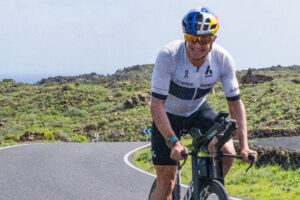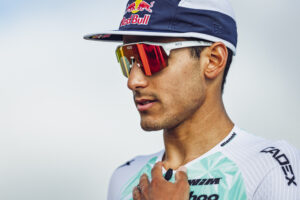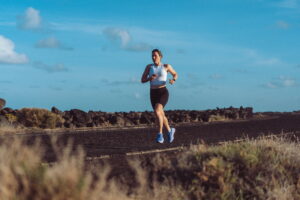The Kona reality hit Rappstar
Jordan Rapp announced this past weekend on his Rappstar blog that his Kona 2014 ambitions end now. He will instead focus on other events including the Ironman 70.3 World Championships in Mont Tremblant and getting ready for Kona 2015.

Slowtwitch: Jordan, you announced the end of your Kona road this year. How tough of a decision was that?
Jordan Rapp: It ended up being an easier decision than it might have been because I didn’t get a slot from the first round at the end of July. That obviously didn’t mean I wasn’t get one, because let us say someone maybe breaks a leg or finds out the wife is pregnant, and if that slot gets turned down any time leading up to Kona from that first round, that slot would still go to me. But no one who qualified did not take that slot, and that was actually the first time since they have gone to the KPR system that that hasn’t happened. I actually think that is a good thing, and part of the reason that happened – last year changes were made how the points were handed out and it really rewarded podium performances. In general the people who got slots were the people who thought they could do well in Kona. But I was a bit on a fence to going to Kona anyway. I was registered for Mont Tremblant in case I didn’t make it, and I thought maybe I could do a few more halfs, but Joel [Filliol] said early on that he didn’t think that I should go this year. After he said that I needed a couple weeks to think about that, and then I got sort of ok with that. I thought I might just not take it, even if I get a roll down or a straight in. So when it happened and the slot did not roll down, it was actually a bit of relief. It would have been hard after an email with “you qualified for the World Championships” to say no to that. So I am glad that I didn’t have to do that and that I could basically just let the decision be made for me. It was certainly the way I was leaning with my rational brain, and I knew it was definitely the right decision, but emotionally it is always hard to say. Even in 2011 when it was the first year of the KPR system, when I got the email after Ironman Canada that said “you qualified,” to turn that down – even though I had no plans to go to Kona, was hard. It is hard to turn down Kona.

ST: So what if that slot turns up?
Jordan: Even if someone turned down the slot now, or I qualified in the second round, I would now for sure turn down the slot. Now I have taken a long view, or more of a sensible view, getting healthy and doing well and not going to Kona. And really, I should not have gone last year. It is obviously not for the exact same reasons, but the whole idea to make a decision for the long term versus the short term is actually a good thing.
ST: How did you break it to your sponsors, and how did they take it?
Jordan: I don’t know, I guess we will know if they are disappointed at the end of the year when it is time to renegotiate the contracts. But so far most people have been supportive. When you look at the sponsors that I have, Specialized for example – they have had 3 wins in the past 7 years I believe, two with Chris and a course record with Crowie. To Specialized it is not like “oh you got top ten, that is awesome,” Specialized cares about winning. They want big results, not average ones, and the same is true for SRAM. I figured that if I don’t come in the top 5, there is likely no value to my sponsors. A sponsor won’t say “we will do a big ad campaign around you because you came 8th.” To come and be top 5 I have to be better than I have ever been, and that is definitely not where I am right now.
ST: But you have not been top 10 yet. Would that not be a satisfactory step?
Jordan: But that is a personal thing, that is for me and not for sponsors. There are a lot of guys who are perpetually in 7th or 8th place, and Michael Lovato was that. Andy Potts has kind of taken over that spot, and yet they kind of only seem to sit there. They kind of have never cracked that next level. Freddy van Lierde was never in the top ten until he was 3rd. The year he won Abu Dhabi many people thought he would do very well in Kona and he ended up 13th or 14th, then he did not finish after winning Abu Dhabi again, and then seemingly out of nowhere the next year he comes back and finishes third. He obviously did not need to come top ten – he just needed to figure out how to approach the race. And I feel that is kind of the case for me.

ST: What went wrong in Kona last year?
Jordan: Last year I think I had a great swim, but I focused too much on my swim for most of the year and I forgot to do all the other stuff like the heat training, the big bike volume and all the other stuff that had made me successful at all the other races besides Kona. Having seen that, for me at least, I will have my best race if I just prepare the way I know to get ready for an Ironman and don’t really prepare for Kona. Some people prepare specifically for Kona and for some people that works, and Pete Jacobs would be a prime example. Pete was able to get ready for Kona, in a way he could not do for any other race, and do much better there at least for that stretch where he had that second place and then obviously won. But Pete is very different from me in a variety of ways, for one he is such a good swimmer and secondly we approach things mentally much different.
ST: On your blog you mentioned having raced too much in 2012 and how that hurt you moving forward. How does all that racing you recently did compare to that?
Jordan: Oh, I mean I did five 70.3 races in six weeks, and I would say after the last one I was maybe almost as tired as if I had done one Ironman. But it was not even close. It was not just about the racing but also the training. Because the races were so close together I didn’t really train much in between. But you can certainly blow yourself to pieces doing too many 70.3 races. If I had done let us say 5 half Ironman events in like 3 months it probably would have been murder on me because I would have done so much training. I would have been I will do a big build for this race, and then you do the race and then taper into the next build and so one. But you could also see in my performance that I never ran faster than 1:17. I kind of went as fast as I could go, but it was not that fast because I never did the appropriate 70.3 run training. That also made it easier, as it is much harder on your body when you are running faster. But even with big 70.3 training blocks you can do many more than of the long stuff.

ST: What is the story with Melbourne 2013?
Jordan: I was supposed to fly to Melbourne 12 days before the race and at 2am on Wednesday, and I was supposed to fly out that night, I changed my flight to Sunday because I was so sick and hacking up green stuff. Why on earth did I decide to change my flight instead of canceling it? But that was the mentality. I gotta do this race because I gotta get those points, because I have to get to Kona and I need to have the whole year to prepare. But no one put that pressure on me. The people in Melbourne did not put that pressure on me, they did not even know I was sick. The sponsors also did not put that pressure on me – I did all that by myself. Some folks said it was the KPR system that was to blame, but athletes have been making dumb decisions for a very long time. I was just the latest and I made those decisions. Of course I then get back from Melbourne and somehow having managed to pull out that fourth place, which turns out under the circumstance to be one of my best races, and what do I do after my return? I decided to take a week off and then immediately started training for St. George. I had my Kona spot with the points from Melbourne, and I had just done a race where I was literally hacking my through the course, and then I get on it again. How stupid was that?
ST: It seems you learned a lesson.
Jordan: If I had listened to people who are smarter than me, and that includes my wife, I could have avoided making those mistakes.
ST: Unlike the Olympics, Kona comes every year. Does that make it easier to not go?
Jordan: Oh yeah, that is actually something I thought about when Simon went to Athens as the defending gold medalist and it did not go the way he wanted. He then had to rebound from that and say well, I have 4 years to get ready for Beijing. He then went there to get a silver, and man how much easier do I have that. Plus with Simon missing that opportunity and then grabbing silver and almost winning it four years later makes me think there is no reason why something like that couldn’t happen to me.

ST: I assume your sponsors did not learn about you not going to Kona on your blog or this interview.
Jordan: The blog post actually started as a letter that I sent to my sponsors about half a week ago. So in that case that is something I communicated with them before I communicated it with anyone else. I wanted to share it first with the people who enable me doing this.
ST: So you would first go to Jill and ask about possibly having triplets before announcing it on your blog?
Jordan: Yes, if that was a decision I was wishing to do. Then I would certainly…. I can’t even imagine that.






